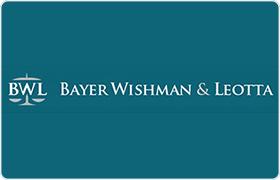 La Mirada Credit & Debt Lawyers, California
La Mirada Credit & Debt Lawyers, California
Sponsored Law Firm
-
 x
x

Click For More Info:
-
Bayer Wishman & Leotta
1055 Wilshire Blvd Suite 1900 Los Angeles, CA 90017» view mapBankruptcy & Debt Experience, Affordability, & Expertise
The Los Angeles bankruptcy lawyers of Bayer Wishman & Leotta have successfully represented clients in the Los Angeles area for over 37 years. Bankruptcy is all we handle.
800-942-4591
Lawyers
1-2 of 2 matches
Personal Injury, Credit & Debt, Corporate, Employee Rights, Litigation
Aviation, Trusts, Business, Credit & Debt



 Leon Bayer Los Angeles, CA
Leon Bayer Los Angeles, CA Practice AreasExpertise
Practice AreasExpertise